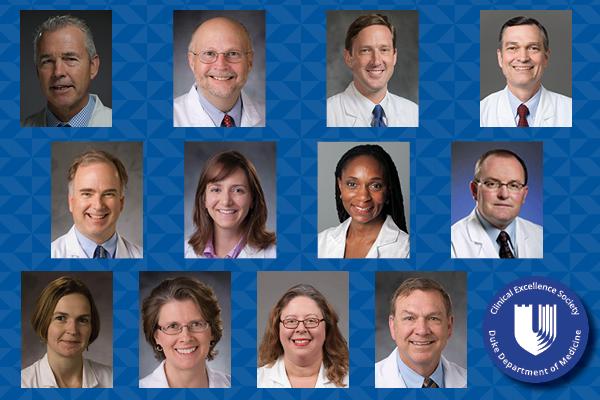
The Duke Department of Medicine has selected 12 faculty members for the inaugural class of the Clinician Excellence Society. It’s an expansion of the Master Clinician Awards and recognizes faculty members across the department who have made significant contributions to patient care, clinical innovation, and training the next generation of physicians.
“The Clinical Excellence Society provides an opportunity to establish a group of dedicated clinicians who truly excel in clinical practice,” said Dr. Kathleen Cooney, chair of the Duke Department of Medicine. “These physicians we rely on for advice on the most challenging cases and who we ask to take care of our family members.”
For the inaugural induction, we aimed to have broad representation across the many divisions and specialties across the department. The inductees are widely regarded as “the doctor’s doctor” and were nominated by either a peer or leader within their division.
Meet the 2024 Members
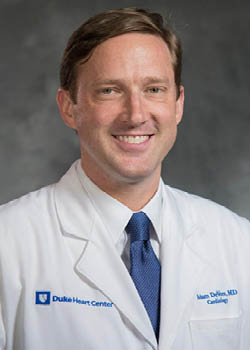
“Dr. Devore is universally recognized as an outstanding clinician,” said Manesh Patel, MD, Distinguished Professor and chief of the division of cardiology, who nominated DeVore.
He is a cardiologist and associate professor in the division and is primarily focused on caring for patients with heart failure, including those with left ventricular assist devices and heart transplants. DeVore also serves as the medical director of the Duke Heart Transplant Program, he rounds on the inpatient Heart Failure/Transplant service, the Coronary Care Unit, and the weekly Heart Failure and LVAD clinics.
“More important than his incredible clinical work ethic though, is his remarkable compassion for these frightened and seriously ill patients facing a heart transplant, and his respect and kindness to the clinical staff and trainees working with him.”
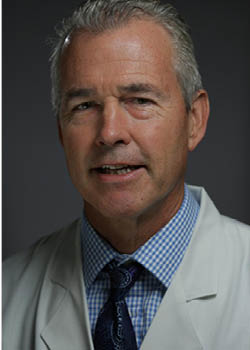
“Butterly is highly regarded by virtually all nephrologists and many other referring and partnering physicians in the Triangle area for his clinical expertise in general nephrology, hemodialysis and kidney transplantation,” Myles Wolf, MD, Distinguished Professor and chief of the division of Nephrology, who nominated him. “Butterly is a consummate clinician educator,” he continued.
As a clinician and clinician researcher in the Division of Nephrology, he’s also co-Director of a maintenance hemodialysis unit, and treats patients three days a week at the Duke Health Integrated Practice clinic.
“Reflecting his extraordinary bedside manner, Dr. Butterly’s patient satisfaction scores are among the highest in the Division of Nephrology.”

“Delani is highly respected as a clinician and an educator both within the section of palliative care, among our clinical partners,” said David Casarett, MD, chief of the Palliative Care section in the Duke Department of Medicine, who nominated her.
Mann is currently an assistant professor in the division of General Internal Medicine. “She is a very thoughtful clinician, a strong leader, and an excellent teacher. It is these attributes that warranted her appointment as medical director for our Duke Raleigh team,” he continued.
“In the 4 years since taking on that role, Delani has done an outstanding job of solidifying palliative care’s role at DRaH, growing our team, and developing a tight network of relationships and partnerships, most notably with cardiology and oncology. She is also a highly effective advocate for palliative care with hospital leadership.”
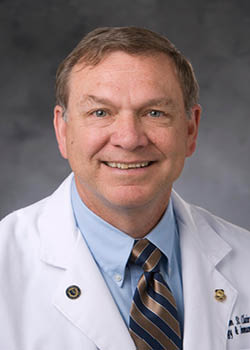
“Bill St. Clair is a remarkable rheumatologist with a passion for both patient care and the pathophysiology of our most complex diseases,” said Megan Clowse, MD, MPH, Chief of the Division of Rheumatology, who nominated him.
St. Clair, previously served as the division chief and his research is primarily focused on pathogenesis and treatment of rheumatoid arthritis (RA). He is also a W. Lester Brooks, Jr. Distinguished Professor of Medicine.
“He has been a dedicated clinician since his arrival at Duke in 1980 and is an expert in Sjogren's Syndrome, IgG4-related disease, and autoimmune hearing loss,” Clowse continued. He’s served as a consultant for several pharmaceutical companies who are developing new therapies for RA. Additionally, he was a consultant on NIH study sections for applications related to clinical trials of new anti-rheumatic therapies.
“Dr. St. Clair is a dedicated and masterful clinician who is deserving of joining the first class of the Clinical Excellence Society.”
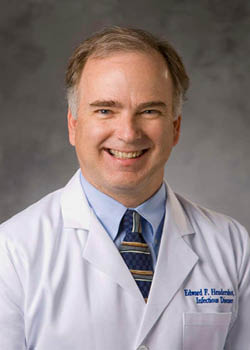
“[He is] simply a superb clinician wrapped in compassion and collegiality. We frequently hear from patients extoling the high-level care that Ted provides,” said John Perfect, MD, Chief of the division of Infectious Diseases, who nominated him. Hendershot is an associate professor in the division.
“Ted is surely a master clinician with excellent patient skills but also is a robust and dedicated teacher of house staff, fellows, medical students and his fellow colleagues,” Perfect continued. “We all learn from Ted’s wide knowledge base and caring visions. It is my pleasure to call him a colleague.”
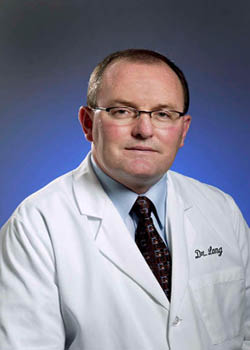
“He is a quintessential ‘doctor’s doctor’,” said Stefanie Sarantopoulos, MD, PhD, Chief for the division of Hematologic Malignancies and Cellular Therapy. “I have worked with Gwynn for over a decade and he certainly provide exceptional expertise with unsurpassed compassion and humility each and every day” she continued. Long is a professor in the division of Hematologic Malignancies and Cellular Therapy.
“If any of the members of our team, including myself, have a patient with a rare manifestation of a rare disease, he is the person to ask,” Sarantopoulos said.
“In particular, over the last several years he has been the beacon for doctors caring for patients with de novo autoimmune disease who might benefit from autologous stem cell transplantation.”
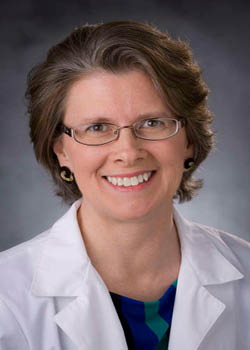
“Dr. White has demonstrated compassion, empathy, and respect for the most vulnerable throughout her career, and her work in the pandemic was simply awe-inspiring,” said Cathleen Colón-Emeric, MD, Chief of the division of Geriatrics, who nominated her.
White is the Vice Chief of Clinical Affairs in the division and serves as geriatrics medical director for Duke Population Health Management Office. She is a member of the Executive steering committee for the Duke University Health System Geriatrics Operational Plan. Additionally, White is the medical director of Croasdaile Village Retirement Community.
“[She has] a passion for providing high quality, patient-centered care to older adults who are too-often dismissed by society,” Colón-Emeric continued. White also teaches residents, fellows, medical students in hospital, clinic and nursing home settings.
“She is an unsung hero of our profession, and is highly deserving of this recognition.”
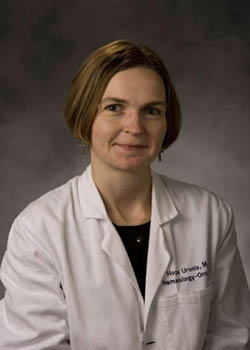
“Hope is known for her extraordinary, evidence-based clinical decision-making and skills, coupled with a compassionate bedside manner,” said Carey Anders, MD, Interim Chief of the division of Medical Oncology, who nominated her. Uronis began her tenure at Duke as a resident and is now an associate professor in the division.
“She is happiest when in the clinic caring for patients, which is why you can find her in the clinic on many non-clinic days,” Anders continued. “She will always do what is right for a patient, without question or doubt. She is beloved by her patients and her peers, including every single person in the clinic,” she said.
“Hope exudes a positive attitude despite very challenging medical and social circumstances which lift her team up to provide best care of her patients.”
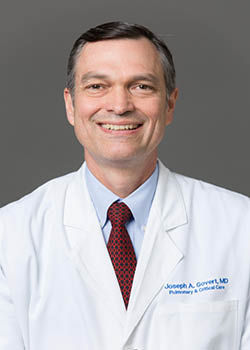
“His moral compass guides every aspect of his practice at Duke, where he has selflessly served as a frontline clinician for numerous years,” said Loretta Que, MD, Chief of the division of Pulmonary, Allergy, and Critical Care Medicine, who nominated him.
“[Govert is] a true clinical scholar,” she continued. He is a professor in the division, and is involved in clinical trials for the adult respiratory distress syndrome (ARDS). “[Govert has] a profound understanding of medicine, coupled with unparalleled clinical acumen and technical prowess, traits that many aspire to attain throughout their careers,” Que continued. Additionally, he’s currently evaluating the efficacy of diagnostic tests for pulmonary malignancy.
“Dr. Govert's exemplary clinical judgment, profound empathy for patients, and passion for teaching have earned him the title of a quintessential role model, revered year after year. He leads by example with quiet authority, earning the esteemed reputation of a ‘doctor's doctor.’”
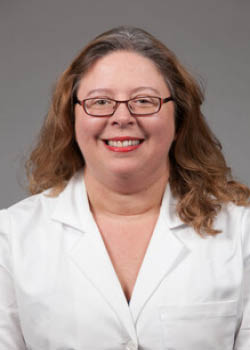
“I have rarely met someone who does so much valuable work and cares so little for accolades; all professionalism and no self-promotion,” said David D’Alessio, MD, Chief of the division of Endocrinology, Metabolism, and Nutrition, who nominated her. Jelesoff, MD, completed her residency at Duke and is now an assistant professor in the division.
“Pounding away week after week in clinic, pouring her heart into teaching one trainee at a time, is not the path to awards and honors at an esteemed academic medical center,” D’Alessio said. “She has requested clinic support to improve her patient’s experience and make their care more accessible, convenient and affordable,” he continued.
“These priorities are as admirable as they are rare and exemplify what makes Dr. Jelesoff a superior physician and faculty member.”
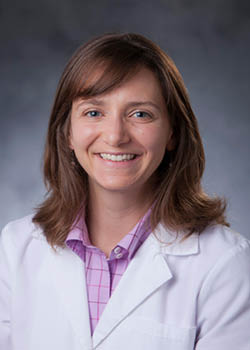
“Dr. Ivey’s commitment to improving patient care is evident in her involvement in multidisciplinary working group focused on resolving discharge barriers for patients in OUD,” said Noppon Setji, MD, professor in the division of General Internal Medicine, who nominated her.
“Moreover, her collaboration with the Duke Law School's Health Justice Clinic underscores her dedication to addressing discrimination against patients with substance use disorder, showcasing her holistic approach to patient advocacy and healthcare,” he continued. Ivey is currently an assistant professor in the division of general internal medicine.
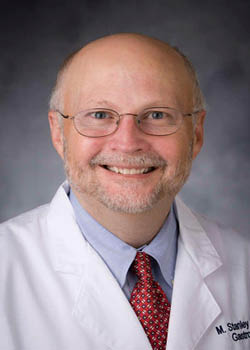
“By remaining at the forefront of the practice of medicine, Stan leads our division in innovative gastroenterology and hepatology,” said Andrew Muir, MD, Chief of the division of Gastroenterology, who nominated him.
“He is often the first person in our division to take on new skills or device training, work out hurdles in patient care, and then serve as the mentor for others who want to learn these innovative skills,” Muir continued.
Branch completed his residency at Duke and is currently a professor in the division of gastroenterology. “His peer teaching has been invaluable to promoting the highest level of skill and medical knowledge amongst the faculty. Branch’s research mainly focuses on endoscopic diagnosis and treatment of biliary and pancreatic disorders, including pancreatitis and pancreatic and biliary malignancies
“He inspires us to learn to our fullest potentials, and to not be deterred by fear of what is not yet known or those procedures not yet performed.”